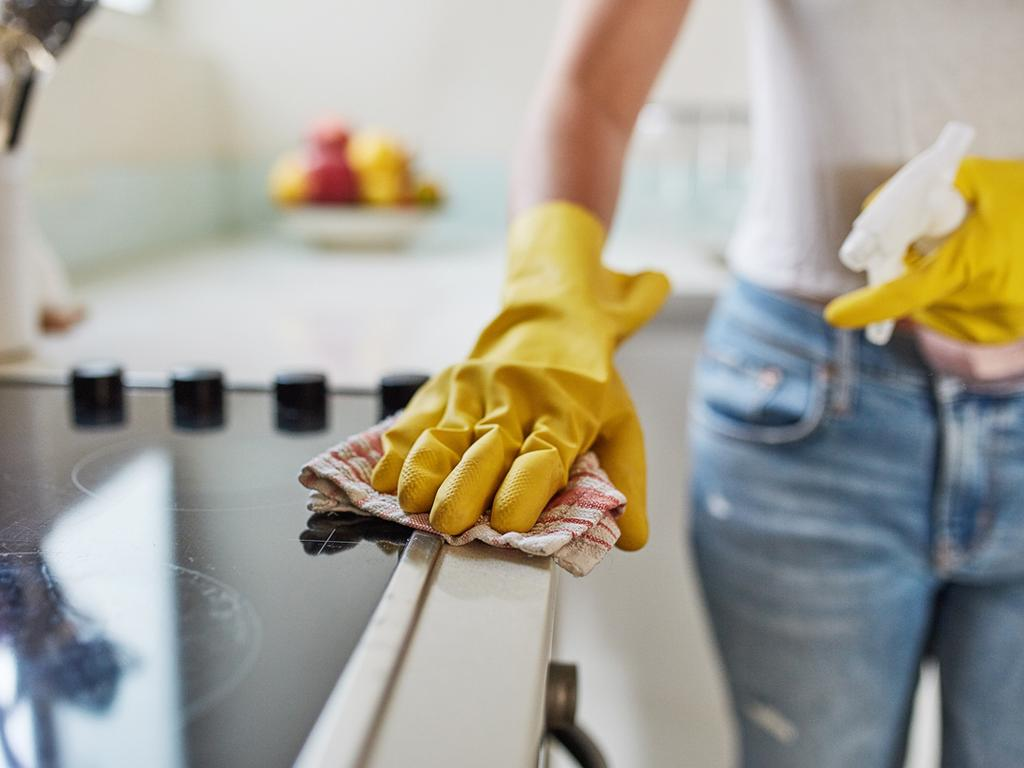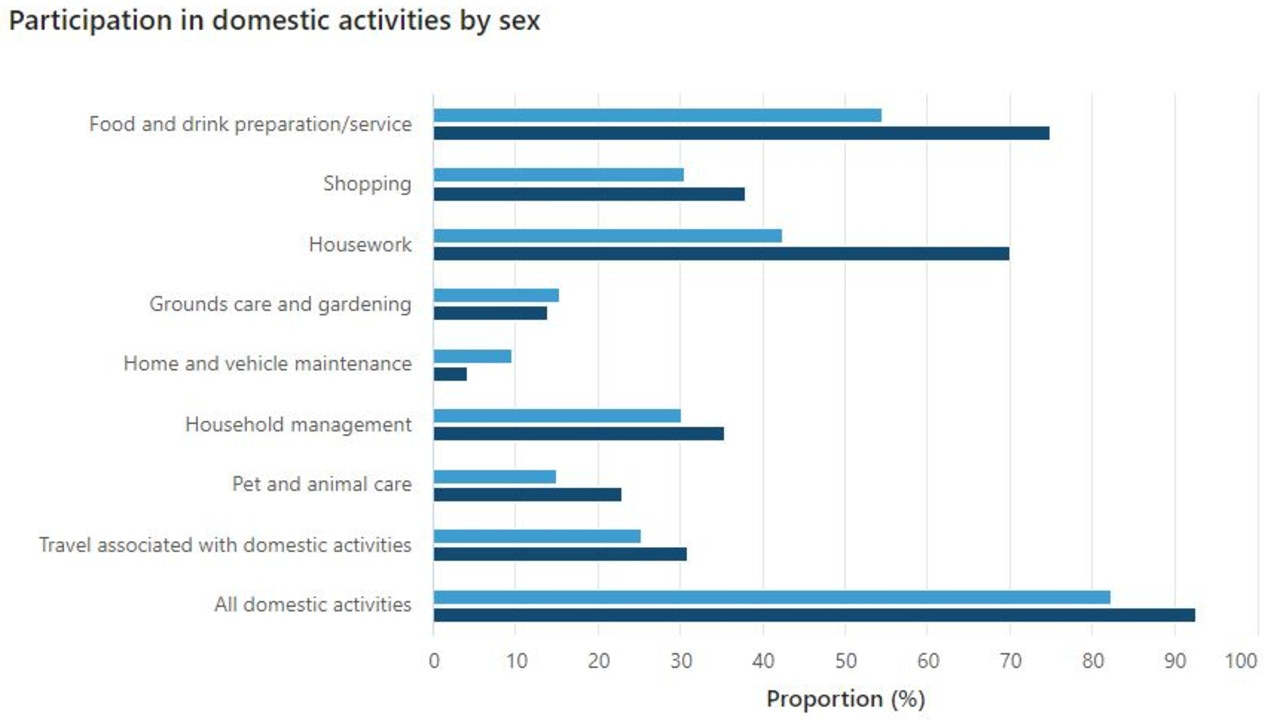Women are doing twice the amount of chores than men, study shows
By
- Replies 9
It doesn’t take a genius to figure out that women generally do more chores than men. However, with a recently released study revealing that females do an average of an hour more of unpaid work every day than their male counterparts, it’s time to set the record straight.
The Australian Bureau of Statistics sampled the daily activities of people aged 15 and up between November 2020 and July 2021.
They discovered that women usually clock four hours and 31 minutes of unpaid work activities daily, while men spend on average three hours and 12 minutes on these tasks.
For those of you who are curious, unpaid work includes domestic duties, such as cleaning the house, doing laundry, cooking, and childcare.
The data, according to Lisa Scanlon, director of Social Surveys and Statistics, provides a 'picture of how people divide their time between work, leisure, caring for others, and other activities'.
'Mothers spent an average of 3 hours and 34 minutes participating in childcare activities a day, while fathers spent 2 hours and 19 minutes,' she explained.

A study suggested that women spend more time doing unpaid work compared to men. Credit: iStock.
Interestingly, men spent about 8 hours and 13 minutes per day on activities connected to their jobs, compared to women's 7 hours and 12 minutes per day.
The poll also shed light on what individuals do with their free time, revealing that, on average, respondents spent 5 hours and 27 minutes each day engaging in social, recreational, and leisure activities.

A graph showing the results of the study. Credit: Australian Bureau of Statistics.
It was revealed that 75 per cent of respondents claimed to watch television on average for two hours and 55 minutes each day, while 20 per cent claimed to spend their spare time engaging in sports, exercise, and other outside activities on average for one hour and 29 minutes each day.
Participants of the poll were also asked how often they felt rushed, and women between the ages of 35 and 44 were most likely to say they felt rushed always or frequently (55 per cent of the time).
Out of the men who took issue with the findings of the study, many called out apparent oversights they claimed were being ignored in the study.
One man questioned: 'Is that because men are more efficient at what they do and get the job done quicker?'
Another added: 'What about mowing lawns and handyman maintenance? Do men get paid for that?'
'Men do the paid work in the real world, that pays to raise the family and grow up… But men don’t get the right to be fully involved parents, they don’t get to "have it all",' a third pointed out.
A few decades ago, the traditional gender roles were very clear. Men were the breadwinners and women were the homemakers. However, this is no longer the case. Women are now working outside the home and are the breadwinners in many families.
This change has been brought about by many factors. Women are now better educated and have more career options than they did in the past. In addition, more and more women are delaying marriage and childbearing, which gives them more time to focus on their careers.
This shift in gender roles is having a major impact on society. For one thing, it is changing the way families are structured. In traditional families, the father was the head of the household and the mother was the caretaker. However, in modern families, the mother is often the breadwinner and the father is the caretaker.
This change is also having an impact on the way children are raised. In the past, mothers stayed at home to raise their children. However, now that more women are working, fathers are playing a larger role in child-rearing as well as childcare centres.
Keeping this in mind, are you surprised by the findings of this study? Share your thoughts with us in the comments!
The Australian Bureau of Statistics sampled the daily activities of people aged 15 and up between November 2020 and July 2021.
They discovered that women usually clock four hours and 31 minutes of unpaid work activities daily, while men spend on average three hours and 12 minutes on these tasks.
For those of you who are curious, unpaid work includes domestic duties, such as cleaning the house, doing laundry, cooking, and childcare.
The data, according to Lisa Scanlon, director of Social Surveys and Statistics, provides a 'picture of how people divide their time between work, leisure, caring for others, and other activities'.
'Mothers spent an average of 3 hours and 34 minutes participating in childcare activities a day, while fathers spent 2 hours and 19 minutes,' she explained.
A study suggested that women spend more time doing unpaid work compared to men. Credit: iStock.
Interestingly, men spent about 8 hours and 13 minutes per day on activities connected to their jobs, compared to women's 7 hours and 12 minutes per day.
The poll also shed light on what individuals do with their free time, revealing that, on average, respondents spent 5 hours and 27 minutes each day engaging in social, recreational, and leisure activities.
A graph showing the results of the study. Credit: Australian Bureau of Statistics.
It was revealed that 75 per cent of respondents claimed to watch television on average for two hours and 55 minutes each day, while 20 per cent claimed to spend their spare time engaging in sports, exercise, and other outside activities on average for one hour and 29 minutes each day.
Participants of the poll were also asked how often they felt rushed, and women between the ages of 35 and 44 were most likely to say they felt rushed always or frequently (55 per cent of the time).
Out of the men who took issue with the findings of the study, many called out apparent oversights they claimed were being ignored in the study.
One man questioned: 'Is that because men are more efficient at what they do and get the job done quicker?'
Another added: 'What about mowing lawns and handyman maintenance? Do men get paid for that?'
'Men do the paid work in the real world, that pays to raise the family and grow up… But men don’t get the right to be fully involved parents, they don’t get to "have it all",' a third pointed out.
A few decades ago, the traditional gender roles were very clear. Men were the breadwinners and women were the homemakers. However, this is no longer the case. Women are now working outside the home and are the breadwinners in many families.
This change has been brought about by many factors. Women are now better educated and have more career options than they did in the past. In addition, more and more women are delaying marriage and childbearing, which gives them more time to focus on their careers.
This shift in gender roles is having a major impact on society. For one thing, it is changing the way families are structured. In traditional families, the father was the head of the household and the mother was the caretaker. However, in modern families, the mother is often the breadwinner and the father is the caretaker.
This change is also having an impact on the way children are raised. In the past, mothers stayed at home to raise their children. However, now that more women are working, fathers are playing a larger role in child-rearing as well as childcare centres.
Keeping this in mind, are you surprised by the findings of this study? Share your thoughts with us in the comments!







